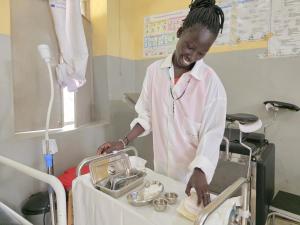Advancing access to sexual and reproductive health services in South Sudan
Juba ‒ In an effort to address severely limited access to sexual and reproductive health and rights (SRHR) services in South Sudan, the Ministry of Health, with support from World Health Organization (WHO) and partners, has been implementing several initiatives to expand access in seven of its 10 states.
Years of overlapping humanitarian crises, including infectious disease outbreaks and complex humanitarian crises driven by conflict and climate-related disasters have disrupted health systems, limiting access to essential health services, including SRHR.
As a result, South Sudan continues to face some of the gravest SRHR challenges globally. Access to family planning is low, with a modern contraceptive prevalence rate of around 6% and an adolescent birth rate of 97 per 1000 girls between aged 15‒19 years.
The country’s maternal mortality ratio is estimated at 692 deaths per 100 000 live births, with around 10% linked to complications from unsafe abortion. The country’s legislation permits abortion only when the mother’s life is at risk. Despite these legal constraints, women may seek unsafe abortion services, often arriving at health facilities with severe post-abortion complications.
With only around 40% of births attended by skilled birth attendants, other key contributors to maternal mortality include postpartum haemorrhage, obstructed labour and sepsis ‒ all of which are preventable with timely access to quality health care.
Health authorities, with support from WHO and partners, have focused on expanding access to care that responds to people’s needs, choices and rights, through resilient primary health systems. This has been done by strengthening coordination, training health workers and improving monitoring. Targeted efforts have focused on equipping health workers with the knowledge and skills they need to deliver better care.
In the northwestern states of Warrap and Northern Bahr el Ghazal, in 2024, 50 health workers were trained in maternal and perinatal death surveillance and response, an important step toward strengthening how maternal and newborn deaths are identified, reported and addressed.
An additional 50 health workers were trained in family planning in Torit and Wau, expanding access to voluntary contraceptive services in primary health centres. In Torit, Malakal, Renk and Wau states, 94 health workers received specialized training in the clinical management of rape, ensuring that survivors of gender-based violence from refugee, returnee and host communities can access timely, compassionate care.
“The training has also enabled me to diagnose patients with syphilis and other sexually transmitted infections. It has really expanded my knowledge and allowing me to assist many mothers,” says Faida Jackline, a 29-year-old midwife from Kator Primary Health Care Centre in Juba.
Improving access to services also means working with communities to create demand and address stigma and misinformation. Because SRHR services have been absent in the past, many people do not know that they are available. Through dialogues, more than 540 local and religious leaders across five states have been oriented on the concepts underpinning SRHR, helping to increase awareness and promote greater use of available services among communities.
WHO has supported the development of national post-abortion care guidelines, recognizing the critical role of safe and timely post-abortion care in preventing maternal deaths. The new guidelines focus on the management of complications from both spontaneous and unsafe abortions.
Around 15 health workers from selected primary health care facilities were trained in the new guidelines and at least 30% of the 35 targeted health centres have been equipped with the necessary tools and supplies to deliver post-abortion care, including manual vacuum aspirators, beds, speculums and consumables.
“In collaboration with WHO, we have been able to successfully implement cervical cancer screening and post-abortion care management in six health facilities within Juba County. We have trained 14 midwives, who are currently doing excellent job screening patients in these six facilities. We sincerely thank WHO and partners for this collaboration,” says Vivian Hawa, Reproductive Health Coordinator at Central Equatoria State’s Ministry of Health.
During 2024, the first year of the project 934 women accessed care for post-abortion complications. This includes 68 health clients from primary health facilities, which initially never had the capacity to provide post-abortion care services.
“Previously we never use to provide post-abortion care at this facility, especially manual vacuum aspiration. However, after receiving the training in 2024, we are now able to attend to women who have had unsafe abortions and perform other post-abortion care procedures,” says Kenyi Emmanuel Wani, a 27-year-old midwife from Munuki Primary Healthcare Centre in Juba, the country’s capital.
As the programme is ending its second year, continued collaboration and investment will be essential to build on these early gains and contribute to longer-term improvements in reproductive health outcomes across the country.
“Access to quality SRHR services is a matter of dignity, rights, and resilience. South Sudan is making important strides to allow women and girls to gain access to the care they need,” says Dr Humphrey Karamagi, WHO Representative to South Sudan. “WHO is proud to support the Ministry of Health in strengthening the health system and ensuring that no one is left behind.”
Communications and marketing officer
Tel: + 242 06 520 65 65 (WhatsApp)
Email: boakyeagyemangc [at] who.int (boakyeagyemangc[at]who[dot]int)
Communication Officer
Mobile: +211 921736375
Email: atema [at] who.int (atema[at]who[dot]int)
